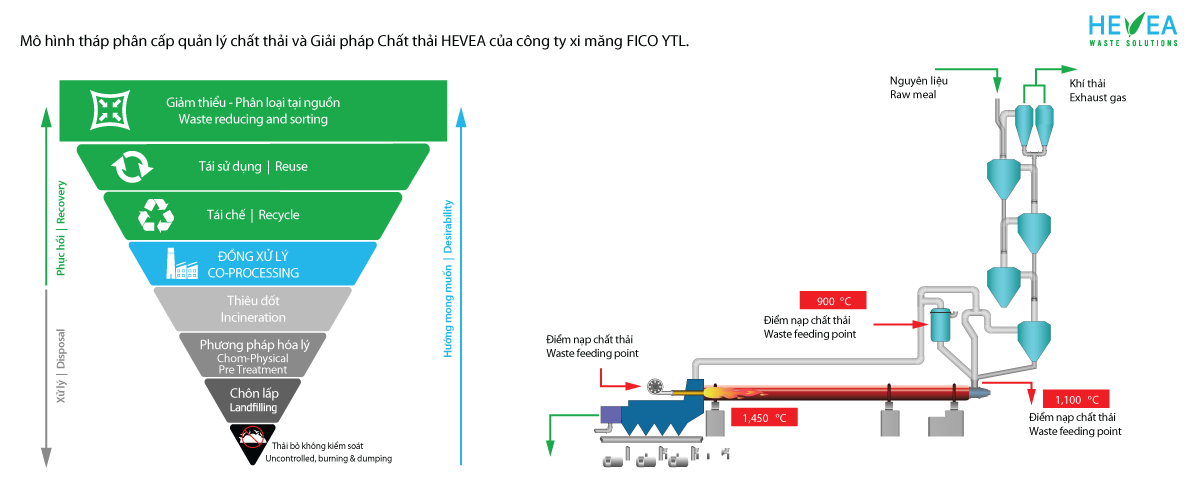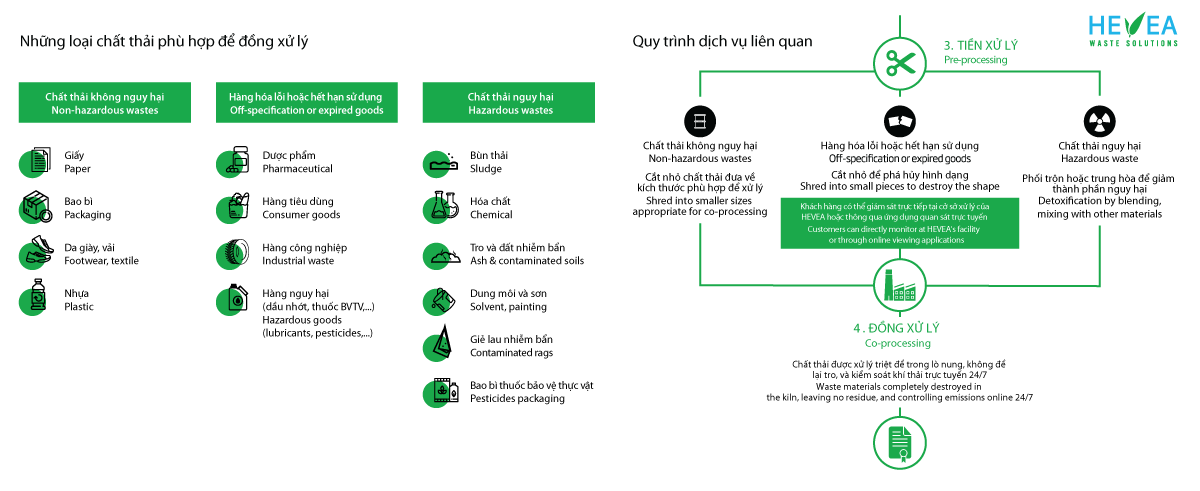At the Vietbuild Exhibition, Mr. Nguyen Phuoc Thuan, Director of Tan Thanh Filtration Company, show his impressed with the Co-processing Technology of FICO YTL, in the cement manufacturing industry.
“With me, the most happiness during the visit was that businesses aiming for zero emissions. They are implementing environmental projects, especially FICO YTL, which has the Hevea Waste Solutions management system together with co-processing technology in cement production,” said Mr. Thuan. From his perspective, these solutions bring dual benefits, as they not only convert hazardous waste into fuel for clinker kilns but also utilize the ash as a catalyst in cement production.
Hierarchical Waste Management and Co-Processing Model According to HEVEA Waste Solutions

Overview of Co-processing Technology in Cement Production in Vietnam
Co-processing is the process of using industrial waste, including hazardous waste, as alternative raw materials or fuel in cement production. In Vietnam, this technology is being applied in cement plants to minimize environmental impact and optimize resource use. (According to ximang.vn)
Using the Heat from Clinker Kilns to Incinerate Waste
Clinker kilns operate at very high temperatures (around 1450°C), which helps to completely burn waste without leaving ash. Using the heat from clinker kilns to incinerate waste not only reduces the amount of waste that needs to be landfilled but also utilizes the heat from the waste to save traditional fuels (such as coal), save electricity, and reduce dust emissions into the environment. (According to ximang.vn)
Utilizing Sludge and Ash as Raw Materials in Clinker Production
Clinker is produced by heating a mixture of raw materials such as limestone, clay, and iron ore at high temperatures in cement kilns. Sludge and ash, after crystallization, can be used as a substitute for clay in clinker production. This not only utilizes industrial waste to replace natural resources but also reduces production costs. (According to ximang.vn)

Some Solutions for Dust Recovery in Cement Plants
In the process of clinker and cement production, dust recovery is crucial to protect the environment and human health. Some effective solutions include:
• Dry dust filtration systems: Including cyclone filtration systems, baghouse filters, cartridge filters, to effectively recover dust at the source, at dust-generating points such as crushing stations, conveyors, coal mills, cement mills, raw material mills, kilns, packing lines, silo tops, etc.
• Electrostatic dust filtration: Using electrode systems, operating by electric field forces to attract and separate dust particles from the exhaust gas stream, recovering them in collection hoppers.

Contact
Tan Thanh Filtration Company has cooperated with Vietnamese Cement Plants for 14 years, successfully applied dust recovery system solutions, and provided dust filtration equipment and filter media in various industries such as cement, steel, wood, energy, food, animal feed, chemical fertilizers, boilers, and industrial waste incinerators in the Vietnamese industrial market.
Refer: About TAN THANH FILTRATION Company
For more detailed information about technology solutions and cooperation, please Contact Tan Thanh’s Engineering Team or direct consultation:
Nguyen Phuoc Thuan
Director
Hotline: 0917531007
Email: kelvin@tatafilter.com
— — —
Editorial Team of TAN THANH Filtration Company Ltd.
Note: Any form of reproduction of the content or images of this article must have the written consent of Tan Thanh Filtration Company.
Sources from the Internet: ximang.vn; vicem.vn; fico-ytl.com; HEVEA Brochure,…
— — —
Further reference
Technical support:
Selecting Filter Materials for Incinerator Exhaust Gas Treatment
Cement dust pollution and dust filter solutions
Products:
Hệ thống thu hồi bụi (Industrial Dust Collector System)
News > Company activities:
Tham dự Triển lãm quốc tế về Năng lượng và Môi trường ENTECH tại Hà Nội
(Participation in the International Exhibition on Energy and Environment ENTECH in Hanoi)
